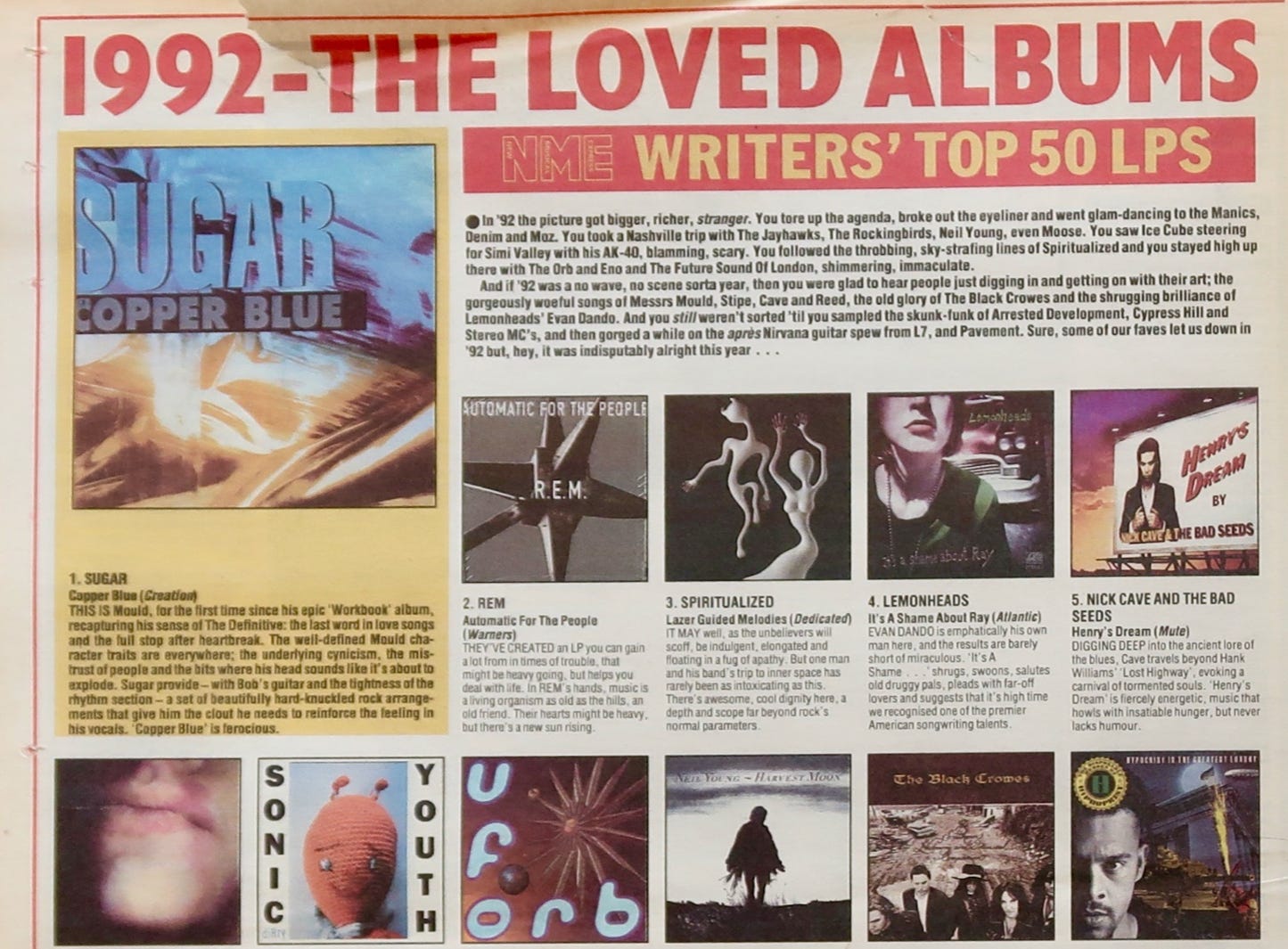I'm writing this on a flight to Italy as we head to Rome for a long weekend, easily making it the most glamorous issue of Fire Red Sky so far.
Although, with our seats one row behind business class, the waft of their free coffee and breakfasts is doing little to hold up my eyelids, heavy after a 4am alarm.
What is keeping me going is listening to Tad's 8-Way Santa for the first time and a bunch of other 90s gems from Seattle and thereabouts as I work my way through Pitchfork’s list of the 25 best grunge of the 90s.
I love a good list, whether one of the scene or era-defining articles that Pitchfork does so well or those best-to-worst career overviews that you can use to kick off internal arguments about why they didn't place your personal favourites in the correct order. But in the last few days I've been considering even more 90s music lists than usual.
You see, today (Saturday) marks National Album Day in the UK. The record company-created celebration of the long-player this year is themed around the decade of grunge (and Britpop and much more) as it "seeks to shine a light on the artists albums that defined the 1990s".
From the industry's point of view this means special vinyl reissues of a wide range of albums, though it's not a list that includes Tad. Instead, there's records by Ace Of Base, Eternal, Lighthouse Family, S Club and The Corrs. But it's not all pop mainstays. Also on the list are Blur's Modern Life Is Rubbish, Dinosaur Jr's Where You Been, Garbage's Version 2.0, Hole's Live Through This, Idlewild's Captain and R.E.M.'s Automatic For The People.
I'm particularly pleased to see Where You Been there as I've got tickets to see Dinosaur Jr play that album, my favourite of theirs, in full next month in London. Another welcome surprise is the Captain mini-album, which is a scrappy punky precursor to Idlewild's best, One Hundred Broken Windows, when they best articulated their alt rock by way of R.E.M. vision.
Record industry "special reissues", however perfect some of them are, is only one way to define the music of that decade.
It was the last time before music would be rocked and rolled by successive online waves, none more so disruptive than Napster's debut in 1999.
Although the internet began to enter everyday use in 1993-4, for me this meant getting my first email address and at university the first steps towards finding Hüsker Dü guitar tabs online. But the technology had a fairly slow uptake in the UK. Just 9% of households had access to dial-up in 1998 and the first commercial broadband service wouldn't be launched until 2000. Around that time my first job in publishing included working on our magazine's first website, whose awful design was inexplicably based on the Blockbusters game show.
From that point onwards music discovery in the Internet age took on a whole new life, hugely opening up horizons. But in the 1990s, in the UK the average indie music fan relied on one of the three, and then just two, weekly music papers, my own favourite being the N.M.E. Its annual end of year run-downs provided the ideal opportunity to tick-off which albums I'd bought that year and look for gaps in my CD collection (I did say I liked a list).
The lists from 1992 (especially given its number one placing for Sugar’s Copper Blue) and 1993 hit a sweet spot of having both the time to listen the radio for hours and hours at a time, usually while doing homework, and also cash from my Saturday job to be able purchase some of the sounds I heard on Radio 1's Evening Session (first with Mark Goodier and then Steve Lamacq and Jo Whiley) or Gary Crowley's Sunday afternoon show on GLR (Greater London Radio).
It's not just my musical tastes that were grounded in the early years of the decade. The indie landscape of the 90s, and beyond, were grounded in the 1991-94 period and the grunge, Britpop and - increasingly - shoegaze it birthed.
Now, thanks to the Internet I can now find all of the 90s best album lists from the N.M.E.
That includes many of those new reissues: Blur's Modern Life Is Rubbish (number 7 in 1993's best album list), Dinosaur Jr's Where You Been (not placed*), Garbage's Version 2.0 (#44 in 1998), Hole's Live Through This (#12 in 1994), Idlewild's Captain (not placed**) and R.E.M.'s Automatic For The People (#2 in 1992).
I had planned to look at the best albums from the 90s, using those N.M.E. lists as the jumping off point. But having landed in Rome and spent three days walking (and eating) our way round the city, I've run out of time for that. Perhaps I'll pick that up in another issue of Fire Red Sky.
* Where You Been was inexplicably overlooked, despite N.M.E. plaudits in 1993 for releases by Nirvana, The Breeders, Buffalo Tom and Madder Rose
** Captain, the 1998 mini-album release from a band whose live sound the N.M.E. memorably described as "the sound of a flight of stairs falling down a flight of stairs", didn't make the paper's best of list that year. The Scottish indie punks' full length debut, Hope is Important, released just nine months after Captain, was placed at number 23 on the 1998 list.


